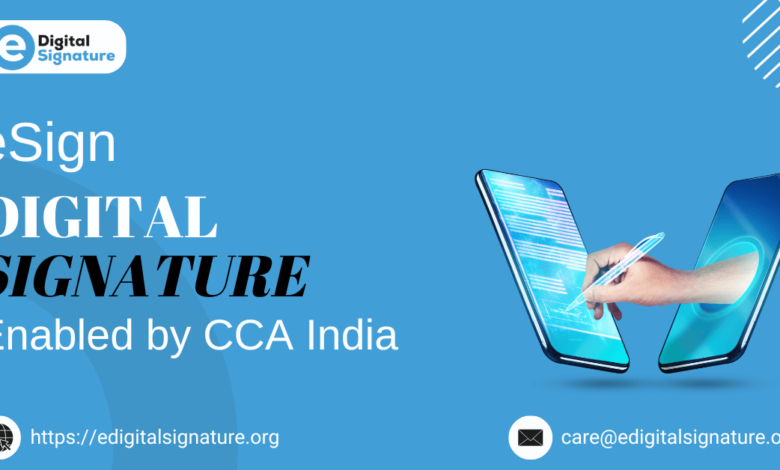eSign: Digital Signatures Enabled by CCA India

In the digital age, the authentication of documents has seen a paradigm shift. One of the most significant advancements in this area is the introduction of eSign by the Controller of Certifying Authorities (CCA) in India. eSign offers a seamless, secure, and legally recognized method for electronic document signing, paving the way for increased efficiency and reduced paper use in various sectors.
Understanding eSign by CCA India
eSign is an electronic signature service introduced by the CCA, the regulatory authority for digital signatures in India. The service leverages Aadhaar, the unique identification number issued to Indian residents, to authenticate signatories and provide legally valid electronic signatures. The primary goal of eSign is to promote the use of digital signatures and facilitate the transition to a paperless environment.
What is eSign?
eSign provides a simple and secure way to digitally sign information anywhere, anytime, without relying on physical cryptographic tokens. Here are its salient features:
Cost and Time Savings:
eSign eliminates the need for in-person physical presence and paper-based identity verification, saving time and resources.
e-KYC Authentication:
Users are authenticated through e-KYC services, ensuring the validity of signatures.
Legally Recognized:
eSign adheres to provisions outlined in the Information Technology Act, making its signatures legally valid.
Privacy Respected:
Only the document’s thumbprint (hash) is submitted for signature, preserving signer privacy.
Flexible Integration:
Application service providers can seamlessly integrate eSign via APIs.
Immediate Key Destruction:
The private key used for signing is destroyed after use, enhancing security.
How eSign Works
Digital Signature Certificate (DSC):
Signers obtain a DSC from a licensed Certifying Authority (CA) under the IT Act. The CA verifies the signer’s identity and address.
Online Signing:
Using e-KYC authentication, signers digitally sign documents online.
Audit Trail:
eSign maintains a comprehensive digital audit trail, confirming transaction validity.
The eSign process involves several key steps:
Authentication:
The user must first authenticate their identity using their Aadhaar number and either an OTP (One-Time Password) sent to their registered mobile number or biometric verification.
Signature Generation:
Once authenticated, the user’s consent is recorded, and a digital signature certificate is generated on-the-fly by a Certifying Authority (CA) licensed by the CCA. This certificate is then used to create the electronic signature.
Document Signing:
The eSign service provider integrates the generated electronic signature into the document, ensuring that any subsequent changes to the document will invalidate the signature, thus maintaining its integrity.
Benefits of eSign
Legal Validity:
Under the Information Technology Act, 2000, electronic signatures created using Aadhaar-based eSign are legally recognized, making them equivalent to handwritten signatures in terms of authenticity and enforceability.
Security:
eSign uses robust security protocols to ensure that signatures cannot be forged or tampered with. The use of Aadhaar for authentication adds an additional layer of security.
Convenience:
The eSign service is highly convenient, allowing users to sign documents from anywhere at any time. This is particularly beneficial for businesses and government agencies that require frequent signing of documents.
Cost-Effective:
By reducing the need for physical paperwork, eSign helps organizations save on printing, storage, and transportation costs associated with traditional document handling.
Environmental Impact:
The adoption of eSign contributes to environmental sustainability by significantly reducing paper consumption.
Applications of eSign
eSign has a wide range of applications across various sectors:
Government Services:
Many government services have integrated eSign to streamline processes such as tax filing, passport applications, and public welfare schemes. This has led to increased efficiency and reduced administrative burdens.
Banking and Finance:
Banks and financial institutions use eSign for processes like account opening, loan applications, and digital contracts, ensuring faster turnaround times and enhanced customer experience.
Healthcare:
In the healthcare sector, eSign is used for signing patient records, prescriptions, and insurance claims, ensuring the security and confidentiality of sensitive information.
Education:
Educational institutions use eSign for student enrollment, issuance of certificates, and other administrative processes, making these procedures more efficient and accessible.
Corporate Sector:
Businesses use eSign for internal approvals, contract signing, and various other documentation processes, improving overall workflow and productivity.
Challenges and Solutions
Despite its numerous benefits, the implementation of eSign is not without challenges:
Awareness and Adoption:
One of the primary challenges is the lack of awareness and understanding of eSign among potential users. To address this, there needs to be a concerted effort to educate individuals and organizations about the benefits and usage of eSign.
Technical Infrastructure:
The effectiveness of eSign depends on the availability of reliable internet and technical infrastructure. In remote areas, where such infrastructure may be lacking, efforts must be made to improve connectivity and access.
Privacy Concerns:
The use of Aadhaar for authentication raises concerns about privacy and data security. Ensuring that robust data protection measures are in place and that user data is handled with the utmost confidentiality is crucial to addressing these concerns.
Legal and Regulatory Framework:
While the legal framework for eSign exists, continuous updates and improvements are necessary to keep pace with technological advancements and emerging security threats.
Also Read, Paperless Digital Signatures – E-signature
Conclusion
eSign by CCA India represents a significant leap forward in the realm of digital document authentication. By providing a secure, convenient, and legally recognized method for electronic signatures, eSign is facilitating the transition to a paperless environment and revolutionizing the way documents are signed and managed. The widespread adoption of eSign has the potential to enhance efficiency, reduce costs, and contribute to environmental sustainability across various sectors.




